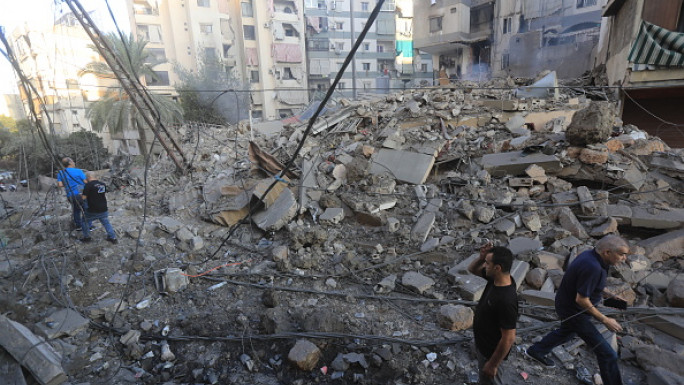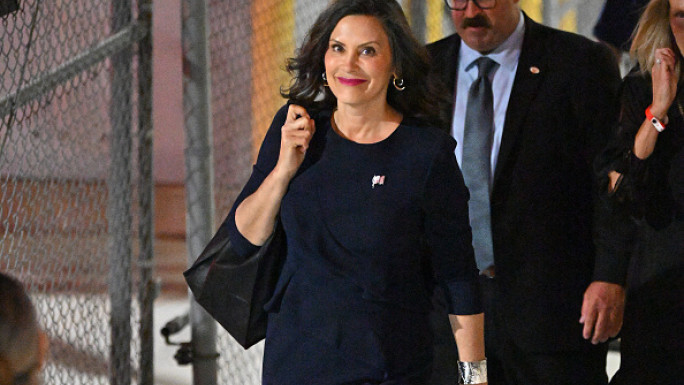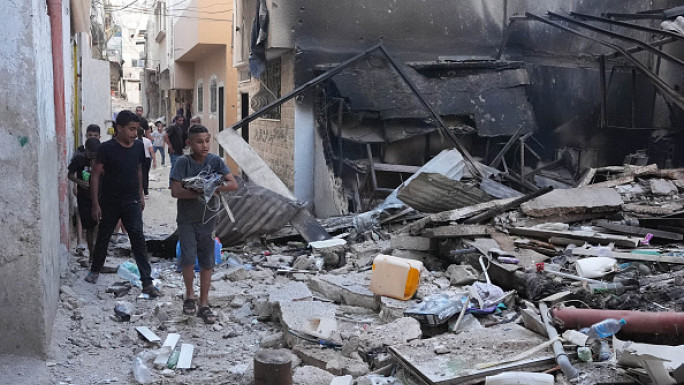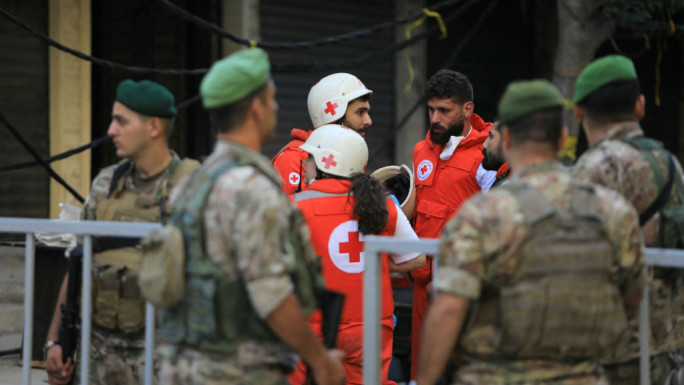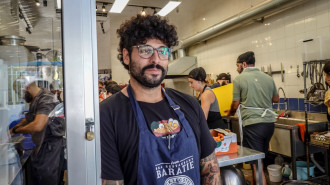
Palestinian actor Saleh Bakri on identity, activism and navigating the emotional toll of genocide in real life and fiction
12 min read
Saleh Bakri didn't always want to become an actor. The eldest of six brothers and son of the revered Palestinian actor and filmmaker Mohammed Bakri had different artistic ambitions as a teenager growing up in the Arab village of Galilee, in Jaffa.
"I wanted to be a painter and sculptor," Saleh tells The New Arab over a video call.
But after taking up acting to combat his social anxiety he fell in love with the craft and the tools it gave him to commit Palestine's past, present and future to stage and screen: "It's a form of resistance," he says. "We want to be independent and to tell our story the way we think and feel it should be told."
Now aged 47, Saleh has become one of the most recognisable faces across Palestinian, Arab and European cinema, and not just because of his pensive blue eyes and dark, now greying curls.
From his frequent collaborations with Annemarie Jacir, including Salt of this Sea and Wajib, to his acclaimed turns in Elia Suleiman's The Time That Remains, Fabio Grassadonia and Antonio Piazza's Salvo and more recently Maryam Touzan's The Blue Caftan, the actor has proven a shapeshifting talent.
His diverse filmography represents an inspiring ability to deepen the complexities of his characters with subtlety, vulnerability and palpable charisma.
His latest role is no different as Saleh returns to screens in The Teacher, a heartfelt reunion with Farah Nabulsi after starring in the British-Palestinian filmmaker's 2020 BAFTA-winning short The Present.
It's an emotive and politically charged social drama about the torrid experience of life under Israeli occupation told through the eyes of Saleh's lonely English teacher Basem and the student he is trying to protect from further tragedy at the hands of Israeli settlers.
The New Arab had a candid conversation with Saleh about his career, censorship and what it means to be a Palestinian actor navigating the emotional toll of genocide and oppression on and off the screen:
Hanna Flint for The New Arab: How are you? How are you feeling at the moment?
Saleh Bakri: I'm feeling as I've felt since the beginning of the genocide: my feelings are not so important [compared to] what we are seeing in Gaza during this vicious, ruthless genocide.
The focus should be there and not on my personal feelings. I'm fine. I do what I do. I didn't lose any of my family members.
In preparation for this interview, I tried to find past conversations with you online, but there aren't very many or very recent ones. Are you not a fan of doing them? What's your relationship with the media?
[Interviews are] less important to me than what I do. The cinema and the theatre that I do are more important than talking about it. It talks about itself. I'm not declining anything but I am not into the media too much. It's not something I run after.
I do it because sometimes it's good to talk about the process, especially for young people looking to be inspired, to know more about this world, about cinema and theatre. I do it for them.
So much about Palestinian cinema is the ability to have Palestinian voices and humanity shared when the mainstream narrative has historically been to marginalise, silence and/or malign. Do you then see your job as a form of activism through your art?
Before I even went to study, I knew that I was doing this as a form of resistance because we were not allowed to tell our stories.
"Our story is being hidden, censored and confronted by a lot of lies and propaganda from very powerful media institutions in the world and Palestine."
So it's a kind of resistance, a fight with a mass media full of lies and complicity with the oppressor.
It's a continuous fight until justice is there in Palestine and on the planet. Artists are universal beings and like every human being, we should fight for a free universe.
Your father (actor and filmmaker) Mohammed Bakri has certainly experienced backlash and censorship. Most famously for his film Jenin, Jenin. But in recent years we are seeing more films coming out of Palestine. Do you think more global eyes are on Palestinian cinema than ever before?
From my experience with the censorship and the persecution of my father, it gave the film a push.
People were interested in seeing the film more but you cannot censor artists today. The internet is there.
You cannot just forbid films or forbid people from seeing whatever they want. It's our work; we do what we do and if they want to censor it, it doesn't matter to me.
I know where I stand in this world, I know where I came from, so I know where I'm going.
"They can bark forever but I won't give up my fight."
After making your screen debut in Israeli film The Band's Visit, you refused to work with Israeli-funded films again. Is that still the case? Are you still getting offers or do these producers and filmmakers know to leave you alone?
I'm getting [fewer] offers from Israelis but more from productions that are in a co-production with Israel, or, supported by the Israeli Minister of Culture.
So I will, of course, refuse, but they still try. I think the Israelis know I am a lost case and I wouldn't participate in anything they would wish me to.
It must be frustrating that you are a Palestinian yet you must carry an Israeli passport and are often referred to as an Israeli-Arab actor — another way in which Palestinian identity can be erased. I'm curious how that might affect your ability to travel or work in Arab countries in Southwest Asia, North Africa or other places.
It is annoying that we are living in Southwest Asia but we are not allowed, generally, to move freely, as in Europe, for example.
So it's not only about the Israeli ID and passport, it's the whole space we are living in. Our leaders need to understand that the most powerful thing you can have in your country is humanity and giving humans the right to move, create, shout, sing, dance, and interact freely with each other.
There is so much diversity in my culture that I am keen and longing to know about but I'm getting older. I'm waiting for the day I can go to Mauritania and do theatre, cinema and work with Mauritanian people instead of meeting Mauritanians in London, Berlin or France.
"Why should I meet my people in the diaspora and not in our homelands where we grew up and lived all our lives?"
We are stuck. When I talk about resistance, I talk also about this: breaking this siege. I have been to Lebanon, Algeria, Morocco, Tunisia, Jordan, and the Emirates.
I've done arts in these places, made friends, fell in love with the people and learned so much. So I succeeded in breaking out of this fake prison they have [created] to limit us, our souls and our spirits from fleeing into the sky of freedom, where all the birds can fly.
I was first introduced to you in Mounia Akl's Costa, Brava, Lebanon starring actor-filmmaker Nadine Labaki. You worked on The Teacher and The Present with Farah Nabulsi, The Blue Caftan with Maryam Touzani, are starring in Cherien Dabis' upcoming project and enjoy a long-running relationship with Annemarie Jacir. Is there something special about working with female filmmakers?
To tell you the truth, I don't see a lot of difference between a woman director and a male director.
Some men are unbearable to work with and some women are unbearable to work with and there are the opposite!
But my experience with women artists has been very nice. I enjoyed working with women directors and felt proud to be part of their creative projects.
I felt like a partner in creating together. It's beautiful to create together and every one of them was a unique experience. I've worked with many women, that's right, but I don't know if it's a coincidence… maybe luck.
You have had various opportunities to work with your actor siblings too and your youngest brother Mahmoud also appears in The Teacher and he led Alam which you also starred in. How is it to see him kick off his career?
My brother is a great talent. He's very unique and has a poetic presence. He surprises me.
Great actors surprise themselves and others. I've seen The Teacher twice and he's doing beautiful work even though his role is small — he leaves a trace.
Why do you think so many of your siblings became actors?
I think there is something in creativity that fascinates us. To do things, to look for a new thing all the time.
We are six brothers and only one was saved because all the others decided to be actors. I didn't want to be an actor when I was young. Of course, my father was an influence. His presence in our world as children was fascinating.
What was it like growing up with an actor-filmmaker father?
His world was very different from the other fathers in the Palestinian village we were living in.
He'd disappear, go for two or three months somewhere in the world and come back with presents and stories to tell.
Being free just to disappear, and come back after a while influenced me. I wanted to be able to move that easily, to go wherever I wanted and do what I love.
"We inherited his love, his belief in the resistance and how he understood art. These are very special jewels that we proudly got from him: his sense of responsibility towards others, his people, his community and humanity. He wouldn't let go of our rights as human beings and as Palestinians."
To be able to return to our home, create culture, cinema and theatre independently and not rely on bigger countries or others' money and agendas.
He has fought for this independence all his life. I inherited this for my son and I wish my son would inherit this for his son.
So many Palestinian stories are about remembering the past to keep Palestinian culture alive in the present and future. But that often comes with an early loss of innocence for children living under Israeli occupation, as seen in The Teacher and Alam, for example. I feel most Palestinians know the moment they were awakened to that discriminatory reality and wondered if you could share yours.
I felt it the moment I realised that speaking the Arabic language was not welcome. This was my first confrontation with racism.
When you are a kid you don't understand. There is a lot of confusion. I remember thinking, 'Why? Why? Why don't they like my language?" This is the way I talk, that my mother talks, my father talks, my friends, my family, all the people I know.
We are a minority surrounded by a majority of Israelis who don't like your language. When I grew up and went to drama school, I realised that even the Hebrew of the Israelis who came from Arab countries was not acceptable because of the Arabic dialect variations.
The Syrian language, the Hebrew language, the Arabic language – is our heritage. The old Bible is our heritage. The Quran is our heritage and all the mythologies of the area.
Zionism mustn't steal this from us.
"As a kid, I was afraid to speak Arabic loudly because the occupier had a problem with it and I was the occupied kid without clear ideas about identity, politics, the world, and human rights."
Then I got to love my language and appreciate it.
How old were you?
It was during the beginning of my twenties; after I finished the Israeli drama school, I went back to my [Arabic] so I could act in my language.
I didn't have the privilege to study in Arabic because there was not a Palestinian drama academy. I loved it.
I also loved the Hebrew language that I learned. The Rabbi who taught us the Torah – because everybody had to get the diction and speak Hebrew right – would say to all of the students, "Listen to Saleh and learn how to read your Torah!"
This is my heritage. This is our heritage.
You began writing a play called Contemporary but said in late October 2023, that it was "impossible to think and write… where nothing makes sense except stopping the slaughter now." Nearly a year later, with no ceasefire in sight, are you still unable to write?
It was for a workshop between the Royal Court Theatre in London and the Al Qattan Foundation in Palestine and I was supposed to finish it in October so they could translate it and publish it in Arabic and English.
Then the genocide started and I couldn't think of anything. I still cannot sit and write.
I recently came back to reading and I continue, of course, to act, to do my work and to continue my struggle because it's one big struggle. From Gaza to the West Bank to 1948 to the Palestinians around the world and to the humans who still believe in justice and freedom in the world and understand who they should be standing with.
The play is frozen until I can sit and really think. Writing needs a lot of space to contemplate and listen to yourself, to your mind, to your inner truths. It's like when Mahmoud Darwish wrote Dhakirah li-al-Nisyan two or three years after the invasion of Beirut in 1982.
"It's very hard to write during the genocide. It's too big for me to even comprehend, to even understand. The most unbearable thing is that you can do nothing to stop it."
The ones who can stop it are partners in crime. The USA is the ultimate partner in crime. There is no shame in this world.
America's treatment of Arabs has been historically shocking and screen representations have been just as discriminatory. Given you were recently invited to become a member of the Academy of Motion Picture and Science, how do you feel about Hollywood and its response to war?
It's a struggle. In Hollywood, there are artists that I really appreciate and Hollywood is part of creating great directors and actors.
I'm new to this long history and in Hollywood and everywhere I go, I want to keep the light on.
I'm here to shout, to maybe make a change and I wouldn't get any of this if I boycotted Hollywood.
Hollywood is bigger than the USA and Israeli politics. There are Zionists but there are people who I believe are fighting the same fight with me.
So you are now a full member of the Academy?
Yes. I can vote for the films, actors and directors that I see from across the world that are selected for the Academy Awards.
This is my presence there and I found it a beautiful opportunity for me as an artist. For me watching is more [important] than voting.
Anyone in particular you'd like to work with?
I don't have names, but I love cinema. I love some directors and actors more than others.
I love to work with honest, decent people. Whatever comes, is welcome – what is there for the world to suggest?
The Teacher is now playing in cinemas across the UK and Ireland.
Hanna Flint is a British-Tunisian critic, broadcaster and author of Strong Female Character: What Movies Teach Us. Her reviews, interviews and features have appeared in GQ, the Guardian, Elle, Town & Country, Mashable, Radio Times, MTV, Time Out, The New Arab, Empire, BBC Culture and elsewhere
Follow her on Instagram: @hannainesflint



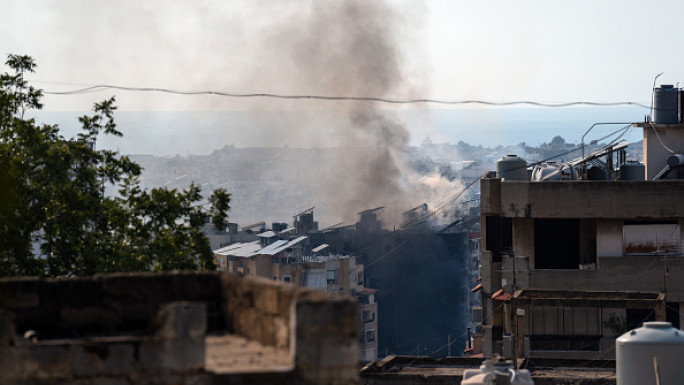
![Minnesota Tim Walz is working to court Muslim voters. [Getty]](/sites/default/files/styles/image_684x385/public/2169747529.jpeg?h=a5f2f23a&itok=b63Wif2V)
